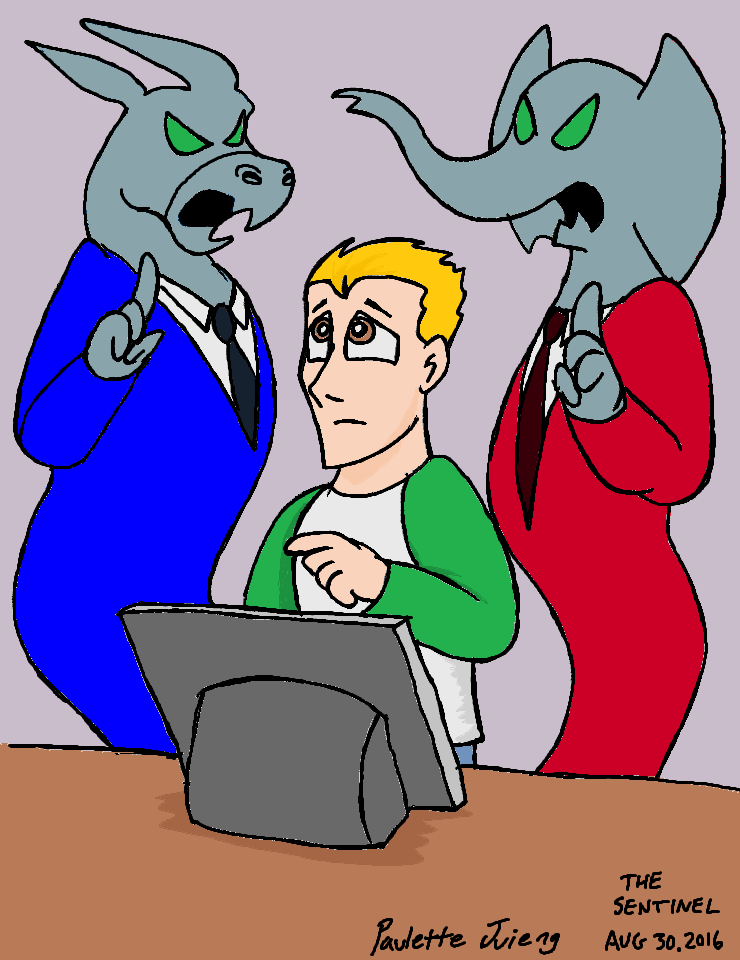Last Monday, Jan. 29, one of our advisers, Rick Crotts, emailed us about an incident that occurred during his class that morning.
He was talking about the recent conviction of Larry Nassar and his case in which more than 250 women have come forward saying he assaulted them.
“I see a guy laughing at the back of the class as I am talking,” he wrote in the email. “I stop mid-sentence and ask, ‘What is so funny? Nothing about this is funny.’ I was stunned!”
Crotts then posted about the incident on his personal Facebook and received a strong reaction. Many women responded to his post with comments about their own experiences and observations.
“He is the face of soooooo many men I have known in my life — several of whom I called boss. All women know that kid,” one commenter wrote.
“He is part of the Not Me generation,” another one wrote.
In the wake of the #MeToo movement, we have seen so much support for it and the women that have been afflicted with the wounds of harassment. Former classmates, teachers, neighbors, family members and friends are finding the voice to say that they too had been sexually assaulted. These women coming forward aren’t just strangers — they’re moms, daughters and sisters.
However, those who fail to recognize the damaging effects of sexual harassment, assault and misconduct also fail to give those affected the dignity, respect and support they deserve.
In a personal statement from the #MeToo movement’s founder, Tarana Burke, after the campaign received TIME Magazine’s 2017 “Person of the Year” award, she proposed the question, “When you hear #MeToo, will you stand up to say #NoMore?”
We still live in an era where sexual misconduct can almost be considered, dare we say — a norm. Whenever there is a movement that means to bring light to a systemic, societal issue and the people affected by it, there is typically a counter-movement, a push to discredit and undermine the issues at hand.
We believe it is human nature to stick to the status quo. A gnawing fear comes with the realization that our fellow Americans might have had a different experience than us, and it is that fear that drives people to deny the existence of an issue.
According to the Rape, Abuse and Incest National Network, someone in America experiences sexual assault every 98 seconds. This is happening way too often, yet the people who should be acting on the issue are not doing anything.
Only six in every 1,000 assaulters will go to prison, according to RAINN. Putting that into a different perspective, just 99.4 percent of individuals who assault people are not getting reprimanded for their horrific actions. This must change.
Being reporters, it’s our job to observe the breaks in the status quo. It isn’t always easy, but the alternative is that the people we consider family, friends and peers are left to suffer alone with an insurmountable issue.
The #MeToo campaign is the product of a combined voice — a collective of people who, tired of that suffering, stood up together to support each other through their experiences with sexual harassment. Their stories deserve more respect than cowardly chuckles. They have suffered enough at the hands of ignorant abusers.
It is difficult to understand how far-reaching the scope of sexual harassment is in the world, yet it is all too obvious what has been done to the victims who now represent the #MeToo movement.
Last month, Dan Harmon, creator of the show “Community,” confessed to sexually harassing one of his writers in an episode of his podcast, “Harmontown.” Not only did he confess to the harassment, he confessed to being part of this larger issue.
He urged everyone listening to actually take the time to think about their day-to-day environment and how they interact with those around them.
“Because if you don’t think about it,” he said, “you’re going to get away with not thinking about it, and you can cause a lot of damage that is technically legal and hurts everybody.”
We have to be able to take stock of not only ourselves but those in our community. We have to think about how we treat people, how we respond to people, how others at KSU and in our community behave toward people and what we can do to call out those who do not take this issue seriously.
No one can successfully string together adequate words to explain the effects that sexual harassment has had and continues to have on our community. Far fewer words defend the idea of silence concerning sexual harassment happening to those around us.
Michigan State University President Lou Anna Simon’s silence brought calls for her resignation. This was after she and other university officials were complicit in the face of Nassar’s acts while he was employed at MSU for 19 years.
Sexual harassment is occurring everywhere, and we would be naive to believe KSU was exempt from it. We know it’s happening here, and we won’t tolerate it.
According to a report The Sentinel published in November, 32 reports of rape had been filed in KSU’s daily crime log since January 2014, and KSU is failing to notify students they are occurring. Those are just the ones that have been reported.
We are responsible for creating a safe space for survivors that will not only defend the justice that they so overwhelmingly deserve but empower them far beyond their experiences.
As more stories surface and more light is shed on these horrific acts, we can only hope that, at the end of the day, KSU will be one of many lights shining to expose this issue at all levels. From the classroom to the president’s office, we plead for students, faculty and staff to speak up.
We have proven time and time again that our words, when united, can sing a tune capable of being heard from every corner of the world. Let’s take this seriously and come together for those who need us.
The call to action for the entirety of the #MeToo campaign has been to speak up and stand up against all forms of sexual misconduct. Yet, it still seems that some people still don’t take it seriously and fail to give those who have endured these horrendous assaults the dignity and respect they deserve.
Take professor Crott’s initiative and speak up, speak out and act against all forms of harassment and misconduct. If you don’t, who will?
If you have experienced sexual misconduct in any form, feel free to share your story and contact feedback@ksusentinel.com
Cory Hancock, Connor Zielke, Payton Butler, Abbie Bythewood, Killian Grina, Elizabeth Nouryeh, Marquis Holmes, Sabrina Kerns and Rio White contributed to this article and make up The Sentinel’s editorial board.


